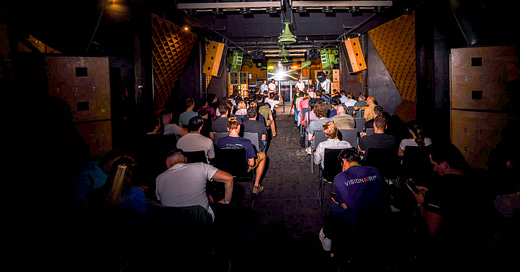After a very long week, the most belated weekly digest to date is a short recap of the European Defense Tech Hackathon we ran this weekend with Entrepreneur First, Benjamin and TUM Venture Labs. A longer write up is coming.
🤼 People
Magnus Freyer - Student at Stanford and Stealth founder
Magnus is a former paratrooper in the Norwegian armed forces, Bain consultant and just now finishing up his degree in Design and Robotics at Stanford before moving back to Europe. He’d participated in the SF NatSec hackathon a few months earlier, and now came to Munich to join the European Defense Tech Hackathon to continue work on his [REDACTED].
Jaanus Tamm - Founder of DefSecIntel and angel investor
Jaanus was a judge and mentor at the hackathon, and is a serial founder in the sovereign compute space. He’s also the first investor in a number of European companies in the space. For multiple of the topics that were presented during the hackathon, he said “I’d love to have that” or “We need that for Estonia” or “[PortCo] could integrate that immediately”.
🚀 Companies
Entalpic - AI for new materials
Status: Early-stage, but raised >€5M
Source: CAVI
Founders: Mathieu Galtier, Victor Schmidt, and Alexandre Duval
Why it’s cool:
Entalpic is a Paris-based, early-stage AI-driven startup that focuses on developing a discovery platform for new materials and molecules to optimize carbon-intensive industries. The company aims to accelerate the energy transition by discovering new catalysts and materials.
Battlemesh - Secure comms with automatic channel switching
Status: Hackathon
Source: Hackathon
Founders: Claas, Daniel, Sam, J-T
Why it’s cool:
Being able to communicate is a distinct advantage. In the words of one UA official: “We’d have lost the war if not for Starlink”. Maintaining connection with troops and devices allows for command to maintain a full picture of the battlefield, or in peacetime allows for stable, secure connection everywhere.
Pulselabs - Building pulsejet engines for cheap interceptors
Status: Hackathon
Source: Hackathon
Founders: Will Yu, Daniel Ringrose, Max Lawrence
Why it’s cool:
Shahed’s are cheap and dangerous. Intercepting them is a massive priority for Ukraine, as they can cause a lot of death and destruction. Electric propulsion interceptors have a thrust issue, in that they can’t accelerate and achieve the same speed as a rocket propelled one. The team has fired some prototypes in both the London Defence Tech Hackathon and the one this last weekend, with the goal of coming up with a design that is cheap and easy to manufacture.
💡 Ideas & Science
One year of GPT4All - a private, local GPT app by Nomic
For those who don’t feel comfortable using the CLI to interact with Ollama, or want to download the ChatGPT app for privacy and questionable data practices, here’s an option!
47 real-world use cases for crypto - by Aztec
Blockchains and cryptography have actual real-world use cases beyond speculation! Can you imagine? No one at Inflection is surprised, but we’re happy for the people that will read this and see why we need this tech for resilient digital infrastructure. There’s a great typo in there I hope no one will change.
Europe is regulating it’s innovation away - Politico
The Nordics and Netherlands are the four countries in Europe that supply the tech advantage to Europe with companies like ASML, Spotify and Novo Nordisk. And in Germany Marvel Fusion announced they’re moving their R&D to the US because of lack of funding and the regulatory environment. We need to change.








